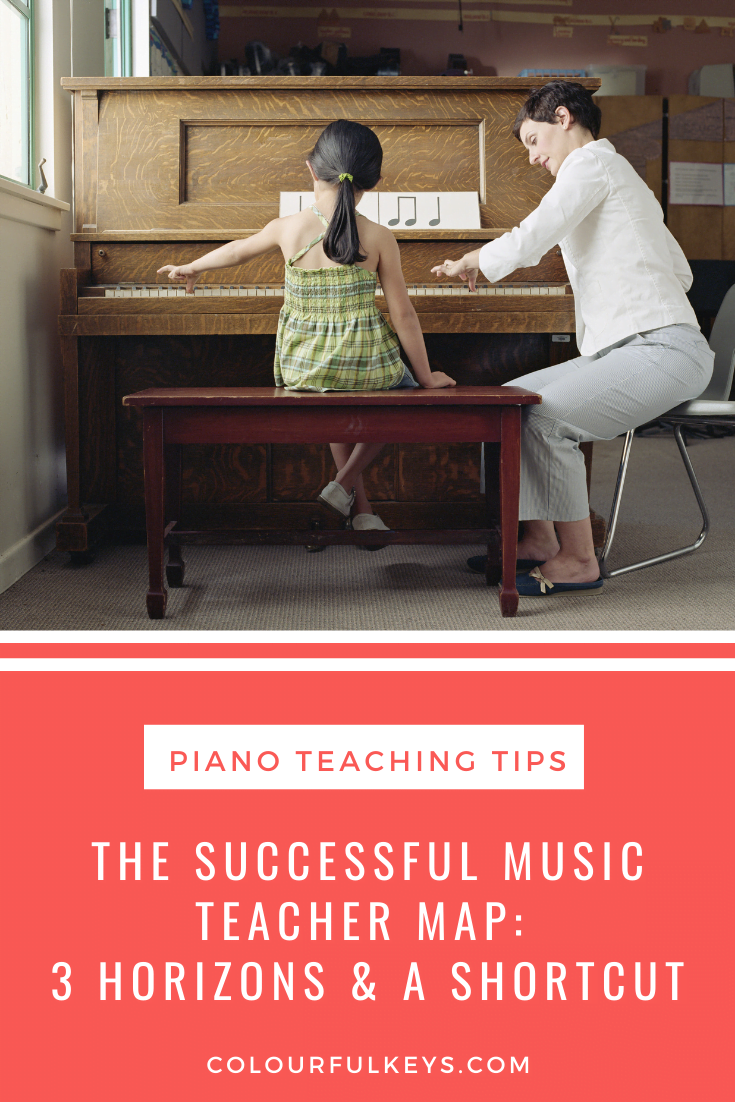Want to feel like a successful music teacher?
Need to quiet that voice in your head which says you’re not doing it right, making enough money or having the right impact?

⬆️ Listen to the podcast above or keep on reading, whichever fits your style. ↙️
Becoming a successful teacher can at times feel confusing, exciting, overwhelming and energising.
Sometimes the path can wind, twist and turn, and – just when you’re feeling like you’ve got your feet – something knocks you back. It seems as if you’ll never find steady footing because the terrain is always changing around you.
There are certain things I wish I knew when I started teaching which would’ve led to me feeling successful far sooner instead of always feeling like an impostor. Let me take you through my journey in this one article to save you hiking the same rocky terrain for the next 5-10 years.
The three horizons are like mirages of success which vanish just as you reach them, and the shortcut is the golden path you need to take.
But you need to work through these horizons before you can take the shortcut. So, don’t skip ahead! (Remember I’m saving you about a decade of your career here. So, you can stick with me for a few paragraphs. Deal?)
Alright, let’s meet the horizons.
Horizon #1: Adding Another Day
You’ll probably start with just a student or two.
Maybe, you seek them out with flyers or a Facebook post. Or maybe your friend’s cousin’s neighbour heard that you play and wants a teacher for their precious little darling. 😇
Either way, you start somewhere – and it’s usually with one or two students.
Then, things begin to build. You look for more students and, at first, it feels like grappling in the dark. But then a few enquiries come through…and a few more…and that’s when Monday afternoons don’t cut it anymore.
So you start adding students in spare patches and pockets of time throughout the week alongside your classes or your “real” job.

Pretty soon you have a timetable which is spottier than a dalmatian, and you’re constantly trying to make sense of it.
Is this success?
It sure doesn’t feel like it when you’re racing home at 8 p.m. on a Friday to squeeze in that one more student you couldn’t say no to.
Horizon #2: As Many Students As Possible
The sideline thing isn’t working anymore and you’re running ragged trying to keep up with this schedule.
It’s time to go full time.
But just as Murphy’s law predicts, that’s when the enquiries seem to dry up.
Or maybe not dry up completely, but they don’t seem to be coming as thick and fast as before. You’re left clicking through the empty spots in your timetable willing them to fill up and fretting that you made the wrong choice.
So when August rolls around and you’re flooded with referrals, you snap them all up. Thank goodness! You’re able to fill every available white space in your timetable, and you can breathe a sigh of relief.
But soon that breathing becomes shallower and quicker as you slog through back-to-back lessons without a break. You work every after-school hour on the weekdays and all day Saturday.
Surely this is the definition of a successful music teacher…right?
But still you’re not making enough money to feel comfortable. You’re just about paying your bills each month, and you’re worried what’s going to happen in the summer when the timetable gets sparse again.
Horizon #3: Maximising Your Income
This is when you realise the problem: You’re trading time for money. You’re going to be caught in this rat-race until you find a way to move beyond this 1:1 ratio.
At this part of the successful music teacher journey, there’s a fork in the road. You’re likely to be enticed towards one of two faux-horizons:
- Building a school by hiring other teachers
- Switching the lesson format to make more from your hours
Hire Other Teachers
Let’s say you hire other teachers. You’re going to need some more space for that, right?
So you move out of your home and into a reasonably-priced retail space in a small side-street in town. It’s scary to take on another cost, but it’s going to be worth it.
You bring on two other teachers and start to fill up their hours. You keep your own students, of course, but any additional enquiries go to them.
This is awesome because you don’t have to look at that growing waiting list anymore plus you make 20% of the fees from all these new students. It’s such a rush to watch their timetables fill up in no time.
The only hitch is that you’re spending a lot of time fielding these extra student enquiries and setting them up. But you figure this is inevitable in the beginning, and soon it’ll just be the occasional new student like when you were on your own. No big deal.
Except these students don’t seem as sticky as your own students. Many stay for a month or two and then just quit, claiming to get too busy or deciding it’s not for them after all.
As soon as you’ve filled one spot, another opens up and you start the process all over again. You’re teaching a little less but are working ALL. THE. TIME. You’re still hardly making enough to scrape the rent together, let alone making any extra profit to keep for yourself.
Wasn’t running a music school supposed to be the next level of success? Why are you still running on an infinite and unrewarding hamster wheel??
Switch to Group Lessons
If you want to make more money in the same amount of time, but you don’t want to hire other teachers, you might be enticed by the idea of teaching groups.
By teaching multiple students at once, you won’t be trading your time for one person’s money anymore. You can increase your income while keeping the fees affordable for families.

You start with groups of just 2-3 students. This way you won’t have to get any extra space and you can even teach on one piano.
But you quickly realise this isn’t enough students to make it profitable for you. You’re doing a huge amount of extra planning and preparation without making that much more money, and your time is quickly eaten up by the added admin time.
So you decide to expand the groups: You’re going to teach 8 students at once. You even manage to switch things around in your home so that you can set up a full keyboard lab in your basement.
This is great for your bottom line, but you find yourself burning out in a whole new way. You’re spending just a few minutes with each student in class, and you can’t see the progress the way you could when working one-on-one.
You feel frustrated and deflated. You may be a semi-successful businessperson, but you don’t feel like a successful music teacher at all.
If you’re already in the thick of heading toward one faux horizon or another, the resources on my Studio Business hub page can help you re-direct your energies.
The Shortcut to Becoming a Successful Music Teacher
Here it is, your golden shortcut. 🥁🥁🥁
Decide what success means to you.
Being a successful music teacher isn’t one thing. Any of the stages above could have meant success if we had defined what we wanted from the outset.
Decide how much money you want to make, the types of lessons you want to teach and the impact you want to have on people’s lives, then work towards that. If you know ahead of time, you can’t work towards it.
Attempting to be successful without deciding what success means is like going on a roadtrip with no map and no destination.
Sure, that could be a fun adventure for a few weeks. But do you want to live your life like that?
Come up with your definition of success and then map your journey towards it.
It might be a huge school with 20 teachers and 600 students. Or it might be 3 afternoons a week from your own cosy living room. Both are equally valid goals, but you’ll be much happier if you choose your own path instead of hopping on the conveyor belt.
What does being a successful music teacher mean for you?
I’d love to hear your thoughts on this in the comments below or in the Vibrant Music Studio Teachers Facebook group. 🙂

I think another leap is deciding to raise your fees. Will they all quit? Will that parent (everybody has one) complain and spread dissatisfaction?
Yes, it’s a tough one. Often teachers expect more pushback than actually occurs. But it’s scary to take that leap!
First, my piano teaching is a second income that I don’t have to have. I’m teaching piano because I love sharing the joy of playing music. So a good part of this article doesn’t really apply to me.
I set my student limit at 15. Period. I teach Monday through Thursday from 3-5; Thursdays I leave open from 11-3 for homeschool students. Fridays are for temporary schedule hiccups (as in sports practice/games/other after school activities) or make-up lessons, as are evening hours during the week. 5:30 & on is my family time. That is my priority. I have had more students, up to 23 a couple of years, and found that just doesn’t work for me. I do use evening hours when needed, like when I’m going to be out & want to give everyone a chance to get the next week’s lesson in.
Last year I switched to charging a set fee per month. No one balked at the cost. This year I upped that fee as I felt I was coming out on the short end of the stick. Again, despite my fear of increasing the fee, everyone signed back up with no questions.
I used to charge less than other local teachers as it’s not my only source of income, but then I realized if I’m not making it a priority for me, then parents are not going to make it a priority either.
I still get ticked when piano gets pushed aside because “we just didn’t have time to practice this week.” No amount of encouragement, emails with “how to help your student practice”, nothing seems to work. So I keep trucking along and do the best I can to keep that student engaged. . . hoping the student will get the parent on board with making lessons a priority rather than a backseat production.
Forgive my ramblings. I really enjoined this article, even though a good portion didn’t apply to me personally, I see some areas I can tweak. I love hearing how other teachers handle situations that arise then putting it into action or tweaking it to fit my personal situations.
Hi Mary,
I like that you stopped to take the time to comment. It is always encouraging to hear that raising prices didn’t cause any drama. It can be a daunting decision to make!